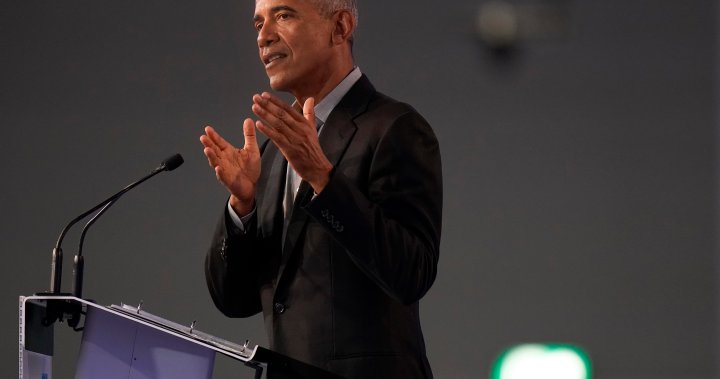Former U.S. President Barack Obama threw his support behind those on the frontline of global warming on Monday, calling for action by rich nations to end years of deadlock with developing countries over cash for climate change.
At the start of the second and final week of the U.N. climate talks in Glasgow known as COP26 – ministers got down to the detail of trying to honor promises to pay for losses and damages, and to address how to help nations adapt to the effects of climate change.
“We have to act now to help with adaptation and resilience,” Obama told a meeting of island nations at the summit, adding that his views on the immediacy of the threat had been shaped by his experience growing up in Hawaii.
The failure of rich nations to make good on promises to provide help for developing countries has fueled mistrust, and is seen as a major obstacle to progress in cutting emissions to limit the devastating impact of global warming.
Read more:
Canada allocates 20 per cent of climate funding to tackle biodiversity loss
Online activist network Avaaz released a video showing Obama had made the same call for action not words to help poor nations as long ago as 2009, but with few results in the ensuing years.
“Everyone knows what is to be done,” said Kenya’s Environment Minister Keriako Tobiko. “There have been too much and too many workshops, retreats and conferences. And it is always ‘the time is now’ ‘the time has come’. Actually there’s no more time, let’s put the money on the table.”
At a U.N. climate summit 12 years ago in Copenhagen, rich nations promised to hand developing countries $100 billion a year by 2020 to help them adapt to climate change.
The target was missed, and at COP26 richer nations have said they will meet the goal in 2023 at the latest, with some hoping it could be delivered a year earlier.
In recent weeks and months rich nations including the United States, Japan, Spain and Italy have raised their “climate financing” pledges, but some still fall short of what international bodies say is a fair contribution.
Ghana’s Environment Minister Kwaku Afriyie said negotiations over funds for adaption and resilience in the nations hardest-hit by climate change were not reflecting the levels of ambition publicly voiced by developed countries.
“It’s very unfortunate and sad indeed,” he said.

While developing countries want more money to help them adapt to higher temperatures that have caused more frequent droughts, floods and wildfires, developed nations have been focused on channeling finance towards cutting emissions.
The cost of both is huge, but it will be even higher unless the Glasgow talks can keep alive a goal that dates from U.N. talks in Paris in 2015 to keep global warming below 1.5 Celsius (2.7 degrees Fahrenheit) above pre-industrial levels.
Beyond the 1.5C level, the world risks devastating climate impacts.
Obama said the Paris agreement he helped to broker had created a framework to tackle climate change, but too little had been done since then.
“We are nowhere near where we need to be,” he told the Glasgow audience, chiding the leaders of China and Russia, two of the world’s biggest greenhouse gas emitters, for failing to even attend the summit.
Read more:
As world leaders gather at COP26, city mayors bypass politics to kickstart action
Their “national plans so far reflect what appears to be a dangerous lack of urgency and willingness to maintain the status quo on the part of those governments, and that’s a shame,” he said.
With activist Greta Thunberg already dismissing the talks as a “failure,” richer nations need to firm up and make good on the many pledges they delivered in the first week of the conference, which is scheduled to finish on Friday.
Underlining the difficulties, COP26 President Alok Sharma said there was a desire among parties “to continue technical work with a renewed urgency to make progress” on climate finance where there was “a large number of outstanding issues.”
“My priority now is pace,” he added. “There needs to be a sense of urgency in all our negotiations.”

Potentially more problematic for rich nations than meeting the $100 billion goal is how they should compensate less developed countries for loss and damages caused by historic emissions, an area where concrete pledges have yet to be made.
Sharma acknowledged that this was a historically polarizing issue, but said he believed “the mood music has changed somewhat.”
“There is now a practical recognition that action is needed on this topic in the face of growing impacts,” he said.
(Additional reporting by Jake Spring, Simon Jessop, William James and Andrea Januta; Writing by Elizabeth Piper, Barbara Lewis and Gavin Jones; Editing by Edmund Blair, Alex Richardson and Catherine Evans)














































